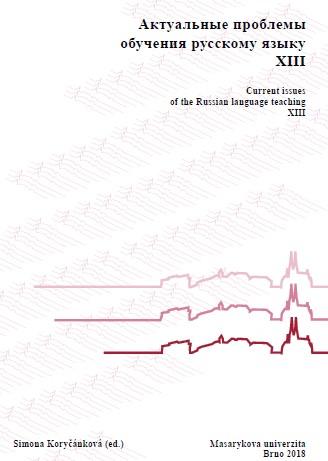ИННОВАЦИОННЫЕ ИЗМЕНЕНИЯ В СТРУКТУРЕ СЛОВОСОЧЕТАНИЯ И ПРЕДЛОЖЕНИЯ В РУССКОМ ЯЗЫКЕ КОНЦА ХХ – НАЧАЛА ХХI ВЕКА
INNOVATIVE CHANGES IN THE STRUCTURE OF WORD COMBINATIONS AND SENTENCES IN THE RUSSIAN LANGUAGE OF THE END OF THE XX – THE BEGINNING OF THE XXI CENTURY
Author(s): Stanislav Aleksandrovich Rylov
Subject(s): Syntax, Eastern Slavic Languages, Transformation Period (1990 - 2010)
Published by: Masarykova univerzita nakladatelství
Keywords: modern Russian language; innovation; combination of words; simple sentence; "democratization" of syntax; syncretism; analyticism;
Summary/Abstract: Rapid changes in Russian society in the last three decades, its democratization and other social, psychological factors are indirectly reflected in language and speech, including at the syntactic level. An important result of the action of various factors is the mass entry into the literary and speech use of innovations that require analysis and evaluation. The purpose of the research is to identify the most active innovative changes in modern Russian speech, to establish their character, to capture in them the manifestation of the main trends in the development of the syntactic system. The subject of observations and analysis in the work – new syntactic phenomena in the structure of phrases and simple sentences that arose in Russian speech at the end of the twentieth century and are actively manifested in the first decades of the XXI century. The main material was collected by the author himself and was extracted from newspaper texts of modern Russian periodicals, from radio and television. Examples from published scientific works were used. The most active changes in the structure of the phrase are analyzed: transposition (destruction in the phrase of the control connection and development of the coordination connection), innovative shifts, often representing anomalies, expansion of prepositions in subordinate phrases. The most important changes in the structure of a simple sentence are revealed: segmentation, actualization of the necessary part of the statement, compression, parceling, innovative processes in the functioning of impersonal sentences, which are a bright national specificity of the Russian language. The considered innovative changes indicate the manifestation of the main trends: the «democratization» of Russian syntax, the tendency to the development of syncretism, the trend of strengthening of analysis. The results obtained in the work should undoubtedly find practical application in linguodidactics, including in the process of teaching Russian as a foreign language in the Czech environment.
Book: Актуальные проблемы обучения русскому языку XIII
- Page Range: 379-385
- Page Count: 7
- Publication Year: 2018
- Language: Russian
- Content File-PDF

